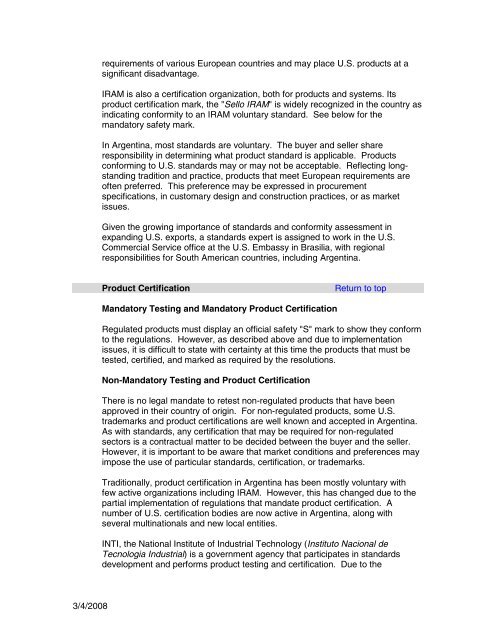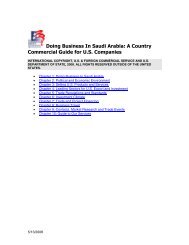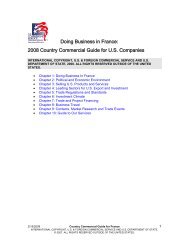Create successful ePaper yourself
Turn your PDF publications into a flip-book with our unique Google optimized e-Paper software.
3/4/2008<br />
requirements of various European countries and may place U.S. products at a<br />
significant disadvantage.<br />
IRAM is also a certification organization, both for products and systems. Its<br />
product certification mark, the "Sello IRAM" is widely recognized in the country as<br />
indicating conformity to an IRAM voluntary standard. See below for the<br />
mandatory safety mark.<br />
<strong>In</strong> <strong>Argentina</strong>, most standards are voluntary. The buyer and seller share<br />
responsibility in determining what product standard is applicable. Products<br />
conforming to U.S. standards may or may not be acceptable. Reflecting longstanding<br />
tradition and practice, products that meet European requirements are<br />
often preferred. This preference may be expressed in procurement<br />
specifications, in customary design and construction practices, or as market<br />
issues.<br />
Given the growing importance of standards and conformity assessment in<br />
expanding U.S. exports, a standards expert is assigned to work in the U.S.<br />
Commercial Service office at the U.S. Embassy in Brasilia, with regional<br />
responsibilities for South American countries, including <strong>Argentina</strong>.<br />
Product Certification Return to top<br />
Mandatory Testing and Mandatory Product Certification<br />
Regulated products must display an official safety "S" mark to show they conform<br />
to the regulations. However, as described above and due to implementation<br />
issues, it is difficult to state with certainty at this time the products that must be<br />
tested, certified, and marked as required by the resolutions.<br />
Non-Mandatory Testing and Product Certification<br />
There is no legal mandate to retest non-regulated products that have been<br />
approved in their country of origin. For non-regulated products, some U.S.<br />
trademarks and product certifications are well known and accepted in <strong>Argentina</strong>.<br />
As with standards, any certification that may be required for non-regulated<br />
sectors is a contractual matter to be decided between the buyer and the seller.<br />
However, it is important to be aware that market conditions and preferences may<br />
impose the use of particular standards, certification, or trademarks.<br />
Traditionally, product certification in <strong>Argentina</strong> has been mostly voluntary with<br />
few active organizations including IRAM. However, this has changed due to the<br />
partial implementation of regulations that mandate product certification. A<br />
number of U.S. certification bodies are now active in <strong>Argentina</strong>, along with<br />
several multinationals and new local entities.<br />
INTI, the National <strong>In</strong>stitute of <strong>In</strong>dustrial Technology (<strong>In</strong>stituto Nacional de<br />
Tecnologia <strong>In</strong>dustrial) is a government agency that participates in standards<br />
development and performs product testing and certification. Due to the












